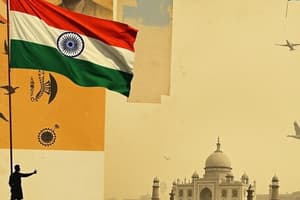Podcast
Questions and Answers
What event led to the partition of India in August 1947?
What event led to the partition of India in August 1947?
- Gandhi's Salt March
- End of World War II
- Indian National Congress meeting with British officials
- Decolonization process (correct)
How did the partition of India impact the population along religious lines?
How did the partition of India impact the population along religious lines?
- It led to unity and cooperation between Hindus and Muslims
- It caused economic prosperity for all religious groups
- Both communities remained unaffected by the partition
- It resulted in widespread violence and displacement (correct)
What were the emotional consequences of the partition among Hindus and Muslims?
What were the emotional consequences of the partition among Hindus and Muslims?
- They were deeply scarred by leaving their homes due to religious differences (correct)
- They felt a sense of unity and brotherhood
- They celebrated the diversity created by the partition
- They experienced relief and joy
How did the exodus caused by the partition contribute to the newly formed states?
How did the exodus caused by the partition contribute to the newly formed states?
What continues to be influenced by the events of India's modern history?
What continues to be influenced by the events of India's modern history?
What was the primary aim of the British East India Company when it was established?
What was the primary aim of the British East India Company when it was established?
How did the British Empire exert control over various regions in India?
How did the British Empire exert control over various regions in India?
What impact did the British administration's reforms have on India's society and economy?
What impact did the British administration's reforms have on India's society and economy?
Who was a key figure in the Indian independence movement known for advocating nonviolent civil disobedience?
Who was a key figure in the Indian independence movement known for advocating nonviolent civil disobedience?
What significant event marked the end of the British rule in India and the beginning of its partition?
What significant event marked the end of the British rule in India and the beginning of its partition?
Flashcards are hidden until you start studying
Study Notes
Modern History of India
India's modern history is a complex narrative encompassing significant events such as the arrival of the British East India Company, the British rule, the Indian independence movement, and ultimately, the partition of the country. This chapter in India's past has had lasting effects on its culture, politics, and identity.
Arrival of the British East India Company
In the early 17th century, the British East India Company was established with the aim of trading in spices and textiles from India. However, it gradually became involved in political affairs, leading to increased conflict between European powers vying for influence over Indian territories.
British Rule in India
The British began to exert more control over various regions through a combination of military force and strategic alliances. By the mid-19th century, the British Empire controlled most of modern-day India. The British administration brought changes to governance, land revenue systems, and transportation infrastructure. However, these reforms also led to socio-economic disruptions.
Indian Independence Movement
The Indian independence movement emerged in response to the political, social, and economic impacts of British rule. Key figures like Mahatma Gandhi championed nonviolent civil disobedience, inspiring millions to join the struggle for self-determination. Over several decades, the movement gained momentum, culminating in the partition of India into two separate entities—Hindu-majority India and Muslim-majority Pakistan.
Partition of India
Partition took place in August 1947 as part of the broader process of decolonization. It resulted in widespread violence and displacement, especially along religious lines. The division of the country left deep emotional scars among both Hindus and Muslims who were forced to leave their homes due to religious differences. In some cases, this exodus led to the creation of minority populations within newly formed states, contributing to ongoing tensions.
In conclusion, India's modern history is marked by profound transformations, from colonialism to independence and finally to separation. The legacies of these events continue to shape India today, including its political landscape, international relations, and internal dynamics.
Studying That Suits You
Use AI to generate personalized quizzes and flashcards to suit your learning preferences.




